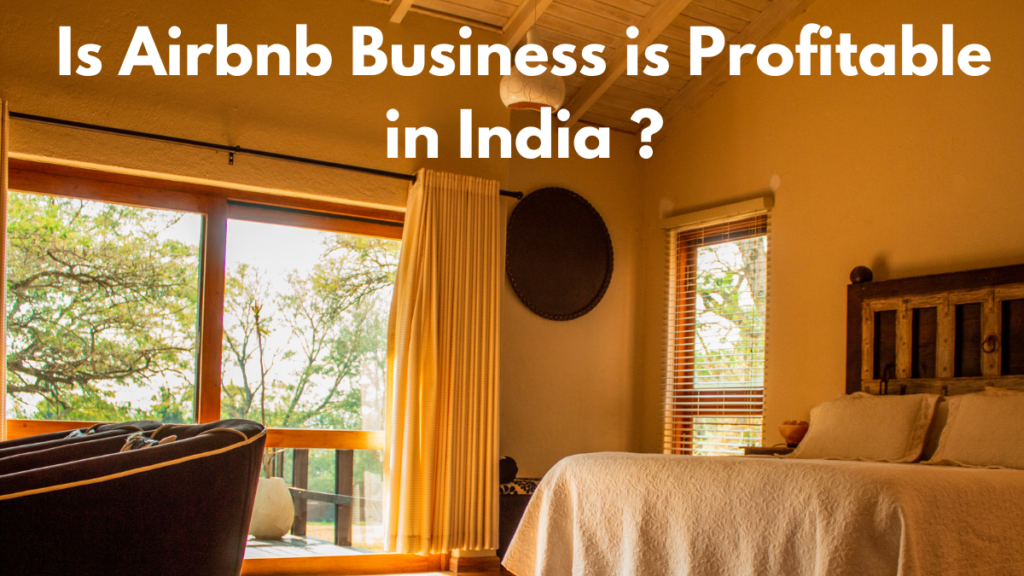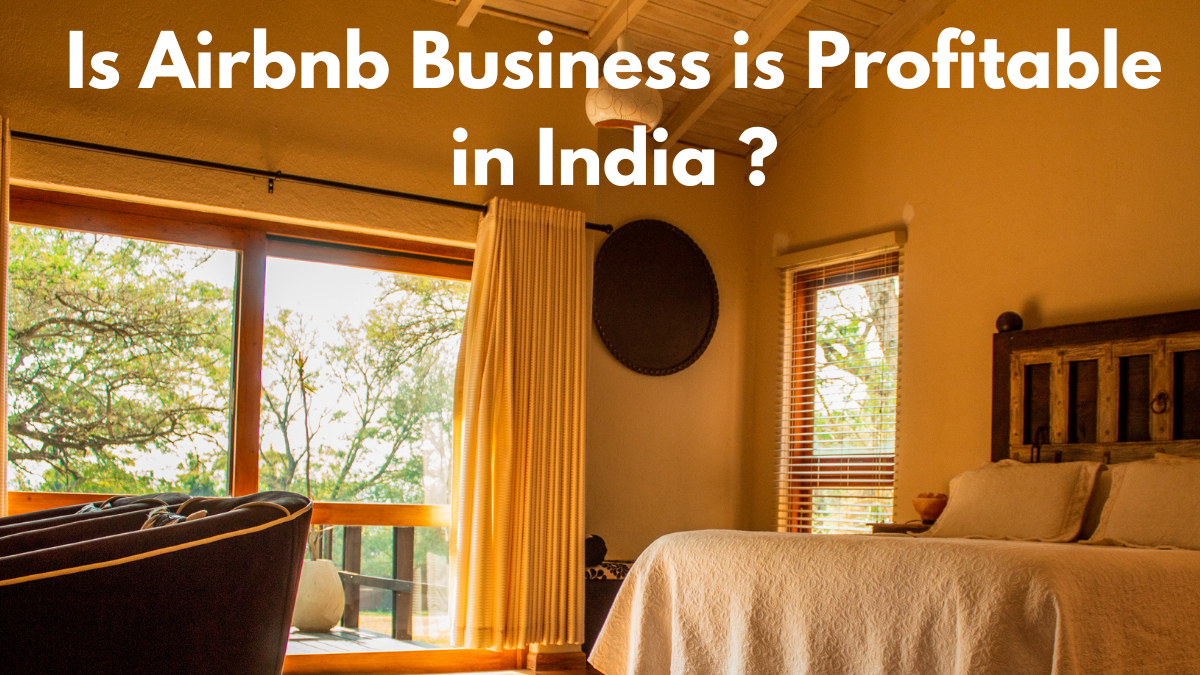Is Airbnb Business is Profitable in India ? In delving into the historical background of Airbnb’s entry into the Indian market, it is essential to understand the broader context of the sharing economy and the evolution of short-term accommodation services.
The sharing economy, characterized by peer-to-peer transactions facilitated by digital platforms, has witnessed significant growth globally. Airbnb, a pioneer in this space, entered the Indian market with a unique proposition that transformed the traditional hospitality landscape.
Airbnb, a disruptor in global hospitality, significantly contributed to India’s economy, adding over US$920 million to the GDP and supporting 85,000 jobs between April 2022 and March 2023, according to a report by Oxford Economics. The study highlights Airbnb’s role in sustaining India’s tourism industry, despite challenges from the COVID-19 pandemic and international travel restrictions. The platform’s transformative impact creates new entrepreneurial and investment opportunities in areas such as local experiences, personalized travel, health and well-being, sustainable tourism, technology-enabled transactions, and regional community development. The study reveals a substantial growth in GDP contribution and job support by Airbnb in India since 2019.

Starting an Airbnb Business in India with Minimal Investment
| Step | Details |
| 1. Research and Planning | Conduct thorough market research to identify low-cost, high-demand areas. Plan the type of property and amenities based on budget constraints. |
| 2. Optimize Existing Space | If you own a property, consider optimizing existing spaces rather than extensive renovations. Focus on essential furnishings and amenities. |
| 3. Cost-Effective Furnishings | Look for affordable yet stylish furnishings and decor. Consider second-hand or upcycled items to minimize costs. |
| 4. DIY Property Improvement | Undertake simple do-it-yourself (DIY) improvements. Painting, minor repairs, and decor upgrades can enhance the property without significant investment. |
| 5. Strategic Pricing | Set competitive but reasonable pricing. Initial low pricing can attract guests, garner positive reviews, and establish the property in the market. |
| 6. Digital Marketing on a Budget | Leverage free or low-cost digital marketing channels. Utilize social media platforms, create a website or blog, and participate in online forums or local community groups. |
| 7. Collaborate with Local Businesses | Form partnerships with local businesses for mutual promotion. Cross-promotions can help increase visibility without significant financial commitments. |
| 8. Implement Self-Check-In Systems | Invest in self-check-in systems to reduce the need for on-site staff. Digital keypads and smart locks can enhance security and streamline the check-in process. |
| 9. Focus on Guest Experience | Prioritize exceptional guest experiences through thoughtful touches and personalization. Positive reviews can drive bookings without major financial investments. |
| 10. Energy-Efficient Practices | Implement energy-efficient practices to reduce utility costs. Use LED bulbs, invest in energy-saving appliances, and encourage guests to adopt sustainable practices. |
| 11. Collaborate with Local Artisans | Source decor items and furnishings from local artisans or craftsmen. This not only supports local businesses but can also add a unique touch to your property. |
| 12. Implement Sustainable Practices | Embrace sustainable hosting practices, such as waste reduction, recycling, and encouraging eco-friendly habits among guests. |
| 13. DIY Photography for Listings | Invest time in learning basic photography skills. Capture high-quality images of your property for your Airbnb listing, eliminating the need for professional photographers. |
| 14. Gradual Expansion | Start with a single property and gradually expand based on profitability. Reinvest earnings into improvements or additional listings as the business grows. |
| 15. Community Engagement | Actively engage with the local community. Participate in local events, collaborate with neighbors, and build positive relationships to foster support for your Airbnb venture. |
Launching Your Unique Airbnb Venture in India: A Step-by-Step Process for Success
| Step | Description | Details |
| 1 | Explore Local Opportunities | Research local areas to identify demand for Airbnb accommodations, considering tourist hotspots and cultural attractions. |
| 2 | Establish Business Structure | Choose a business structure and complete registration, opting for simplicity in the initial stages (sole proprietorship or partnership). |
| 3 | Navigate Regulatory Terrain | Understand and comply with local laws, zoning regulations, and safety standards applicable to short-term rentals. |
| 4 | Curate a Unique Airbnb Space | Invest in creating a unique and inviting space, considering stylish furnishings and amenities that set your property apart. |
| 5 | Budget with Precision | Conduct a detailed budget analysis covering property setup, utilities, maintenance, and marketing costs to ensure financial clarity. |
| 6 | Navigate Tax Obligations | Register for relevant taxes such as GST, maintain clear financial records, and consider consulting a tax professional for compliance. |
| 7 | Craft an Irresistible Listing | Create an engaging Airbnb listing with high-quality photos, detailed descriptions, and personalized touches that appeal to potential guests. |
| 8 | Craft a Digital Presence | Leverage social media and online platforms for cost-effective marketing, connecting with potential guests and local influencers. |
| 9 | Foster Clear Communication | Develop a communication strategy for prompt responses, clear expectations, and creating a welcoming environment for guests. |
| 10 | Prioritize Guest Safety and Comfort | Implement safety measures, document emergency procedures, and invest in guest comfort to garner positive reviews and build trust. |
| 11 | Embrace Sustainability | Consider eco-friendly practices, such as energy-efficient appliances and waste reduction, to attract environmentally conscious guests. |
| 12 | Streamline Financial Management | Utilize digital tools for efficient financial record-keeping, expense tracking, and to ensure timely tax payments. |
| 13 | Engage Locally for Positive Impact | Participate in local events, collaborate with nearby businesses, and address community concerns to build positive relationships. |
| 14 | Stay Agile and Adaptive | Keep abreast of industry trends, continuously seek guest feedback for improvements, and adapt your hosting approach accordingly. |
| 15 | Create Memorable Experiences | Go the extra mile to provide unique experiences for guests, encouraging positive reviews and repeat bookings. |
Market Trends and Dynamics

An analysis of current market trends is paramount to discerning the pulse of the Indian consumer and understanding the factors influencing the demand for Airbnb accommodations. This section will investigate the shifting preferences of Indian travelers, exploring aspects such as accommodation choices, booking patterns, and the impact of cultural and seasonal considerations.
By identifying and dissecting these market trends, the article seeks to offer valuable insights to hosts and stakeholders, enabling them to adapt their strategies in response to evolving consumer behaviors. The dynamic nature of the Indian market necessitates a nuanced exploration of the factors influencing the demand for Airbnb accommodations, providing a holistic perspective on the platform’s role within the broader hospitality industry.
Legal Considerations
Compliance with local laws: This section details the legal obligations for Airbnb hosts in India, covering tenancy regulations and safety standards to ensure adherence to local laws.
Tax implications: It explores tax obligations for hosts and Airbnb, aiding hosts in making informed financial decisions and helping Airbnb navigate tax regulations.
Licensing and permits: This section outlines the necessary licenses and permits across different regions in India, ensuring hosts understand regulatory requirements for a secure operating environment.
Economic Viability
Revenue Potential
This section conducts a comprehensive analysis of the revenue potential available to Airbnb hosts in India. By considering various factors such as location, property type, and prevailing market demand, the article aims to provide hosts with a nuanced understanding of the income-generating possibilities within the Airbnb ecosystem. Hosts will gain insights into how their property’s characteristics and local market conditions impact revenue, allowing for strategic decision-making to maximize profitability.
Cost Analysis
Delving into the financial intricacies, this segment conducts a meticulous cost analysis for operating an Airbnb business in India. The breakdown encompasses all associated costs, including maintenance, utilities, and platform fees. Hosts will gain a detailed understanding of the financial commitments involved in running their Airbnb listings, facilitating prudent financial planning. The aim is to empower hosts with the knowledge necessary to make informed decisions that optimize revenue while effectively managing costs for a sustainable and economically viable hosting venture.
Elevating Your Airbnb Business: 10 Unique Tricks to Increase Bookings and Guest Satisfaction
| Trick | Description |
| 1. Themed Experiences | Create Unique Themes: Develop themed stays or experiences that set your property apart. Whether it’s a cultural immersion, wellness retreat, or creative workshop, offering distinctive themes can attract niche markets. |
| 2. Local Partnerships | Collaborate with Local Businesses: Form partnerships with nearby businesses, such as restaurants, tour operators, or cultural venues. Exclusive discounts or bundled packages with local partners can enhance the overall guest experience. |
| 3. Personalized Amenities | Tailor Amenities to Guests: Gather information about guests’ preferences before their arrival. Personalized amenities, such as favorite snacks, local treats, or special requests, create a memorable and personalized stay. |
| 4. Interactive Digital Guidebook | Create a Digital Guidebook: Develop a comprehensive digital guidebook with local recommendations, house rules, and interactive maps. This provides a curated experience for guests and helps them explore the neighborhood like a local. |
| 5. Engage in Social Responsibility | Support Local Causes: Engage in social responsibility by supporting local charities or causes. A portion of booking proceeds can go to a chosen cause, creating a positive image for your business and fostering goodwill in the community. |
| 6. Themed Pop-Up Events | Host Themed Pop-Up Events: Organize occasional themed events or workshops within your property. This could include art exhibitions, culinary classes, or wellness retreats, attracting guests seeking unique and memorable experiences. |
| 7. Exclusive Loyalty Programs | Implement Loyalty Programs: Introduce loyalty programs for repeat guests. Offer discounts, exclusive access to new offerings, or personalized perks for guests who choose to stay with you multiple times, fostering guest loyalty. |
| 8. Social Media Challenges | Create Engaging Challenges: Leverage social media to create challenges or contests related to your Airbnb property. Encourage guests to share their experiences, tag your property, and use unique hashtags, increasing online visibility. |
| 9. Smart Technology Integration | Implement Smart Technology: Integrate smart home technology for convenience and a modern touch. Smart locks, voice-activated assistants, or personalized climate control systems can enhance the guest experience and set your property apart. |
| 10. Special Packages for Celebrations | Offer Celebration Packages: Create special packages for celebrations such as birthdays, anniversaries, or milestones. Include personalized decorations, celebratory amenities, and exclusive experiences to attract guests celebrating special occasions. |
Challenges and Risks

Operational Risks
This segment delves into the operational challenges that Airbnb hosts in India may encounter, ranging from property management to ensuring a positive guest experience.
Property Damage and Maintenance: Examining the potential risks associated with property damage, the section addresses how hosts can mitigate such risks through preventive measures and robust house rules. Additionally, it explores strategies for efficient property maintenance to ensure a high standard of accommodation.
Security Concerns: Identifying and addressing security challenges is paramount for hosts. This part of the article explores ways hosts can enhance the security of their properties, implement safety measures, and establish clear communication channels with guests to mitigate potential security risks.
Guest Relations and Communication: Effective communication and positive guest relations are integral to the success of an Airbnb host. This section delves into the challenges hosts may face in managing guest expectations, resolving issues, and fostering a hospitable environment. Strategies for building positive host-guest relationships are also explored.
Through a comprehensive analysis of these operational risks, hosts gain valuable insights into the proactive measures they can take to enhance the overall operation of their Airbnb business in India. The section aims to empower hosts to navigate challenges successfully, fostering a secure, well-managed, and guest-friendly hosting experience.
Competition in the Market
In this section, the article delves into the competitive landscape within the Indian Airbnb market, providing hosts with insights into the challenges of standing out in a crowded field.
Market Saturation: Analyzing the extent of market saturation, the section explores the competition hosts face in attracting guests. It addresses the implications of a saturated market on pricing, occupancy rates, and the overall visibility of individual listings.
Diverse Offerings: Given the diverse offerings within the Airbnb platform, hosts must strategically position their listings. The article discusses the challenges hosts may encounter in distinguishing their properties from others, taking into account factors such as property type, amenities, and unique selling propositions.
Pricing Strategies: An exploration of effective pricing strategies is crucial for hosts seeking to remain competitive. The section discusses dynamic pricing models, seasonal adjustments, and other strategies that hosts can employ to optimize their pricing and stay competitive in the market.
Differentiation Tactics: Identifying the need for differentiation, the article provides insights into the various tactics hosts can adopt to stand out. This includes creating appealing listings, leveraging positive guest reviews, and employing marketing strategies to enhance visibility and attract a broader audience.
Role of Technology in Airbnb’s Business Model
This section meticulously examines the pivotal role of technology in shaping Airbnb’s business model, exploring the innovative solutions that have underpinned its success and streamlined interactions between hosts and guests.
User-Friendly Platform: The article delves into the design and functionality of the Airbnb platform, emphasizing how user-friendly interfaces and intuitive features have contributed to the platform’s accessibility and popularity. It explores the evolution of the platform’s interface and how it has adapted to meet the evolving needs of both hosts and guests.
Search and Matching Algorithms: An in-depth analysis of the search and matching algorithms is conducted, shedding light on how technology enhances the matchmaking process between hosts and guests. By examining the algorithms that recommend listings based on user preferences, the article provides insights into how technology optimizes the guest-host pairing.
Mobile Applications: Exploring the significance of mobile applications, the section highlights how Airbnb’s mobile platform has revolutionized the booking experience. It addresses the convenience and flexibility afforded to hosts and guests through features like instant bookings, real-time communication, and on-the-go management of listings.
Safety and Verification Protocols: The article scrutinizes the technological innovations implemented by Airbnb to enhance safety and security. This includes identity verification processes, secure payment gateways, and review systems that contribute to building trust within the Airbnb community.
Emerging Technologies: The section also anticipates future technological trends and innovations within the Airbnb model. This may include advancements in virtual reality for property previews, artificial intelligence for personalized recommendations, and other technologies poised to shape the future of the platform.
Innovations in Customer Experience
This segment delves into how Airbnb continually enhances the overall customer experience through ongoing technological advancements.
Personalization Through AI: The article explores how Airbnb employs artificial intelligence to personalize the customer experience. It delves into how AI algorithms analyze user behavior, preferences, and past bookings to offer tailored recommendations, creating a more customized and enjoyable experience for both hosts and guests.
Enhanced Communication Channels: Examining innovations in communication, the section discusses how Airbnb utilizes advanced messaging platforms and chatbots to facilitate seamless and efficient communication between hosts and guests. This ensures timely responses, addresses concerns, and enhances the overall communication experience.
Virtual Experiences: The article explores Airbnb’s foray into virtual experiences, allowing hosts to offer unique and engaging activities online. It discusses how this innovation not only broadens the range of experiences available but also adapts to changing consumer preferences, providing hosts with new avenues to connect with guests.
Future Technological Trends
Anticipating the trajectory of technology within the Airbnb business model, this section explores upcoming trends that may shape the platform’s future in India.
Virtual Reality (VR) Integration: The article discusses the potential integration of virtual reality in property previews, allowing guests to virtually tour accommodations before making bookings. This innovation enhances transparency and helps hosts showcase their properties in an immersive and interactive manner.
Blockchain for Trust and Security: The exploration of blockchain technology highlights its potential application in enhancing trust and security within the Airbnb ecosystem. It delves into how blockchain can be utilized for secure and transparent transactions, identity verification, and the prevention of fraudulent activities.
Smart Home Integrations: Discussing the rise of smart home technology, the section explores how hosts can leverage IoT (Internet of Things) devices to enhance the guest experience. This may include smart locks, thermostats, and other connected devices that improve convenience and efficiency.
Marketing and Branding Strategies
Building a Strong Airbnb Brand
This section emphasizes the importance of brand building for Airbnb hosts, providing strategies to establish a compelling and recognizable brand image.
Distinctive Property Identity: The article explores how hosts can create a distinctive identity for their properties, emphasizing unique features, aesthetics, and themes. By establishing a clear and memorable property identity, hosts can stand out in a competitive market.
Consistent Branding Elements: Discussing the significance of consistency, the section addresses how hosts can maintain uniform branding elements across listings, communication, and promotional materials. Consistency builds trust and fosters recognition among potential guests.
Positive Guest Experiences as Brand Advocacy: The article explores how positive guest experiences contribute to brand advocacy. Satisfied guests are more likely to leave positive reviews, recommend the property to others, and become loyal customers, thereby amplifying the host’s brand.
Effective Marketing Techniques
This segment provides practical marketing techniques for hosts to attract guests and maximize occupancy rates.
Optimized Listing Descriptions and Photos: The article discusses the importance of creating compelling listing descriptions and visually appealing photos. It provides insights into optimizing content to capture the attention of potential guests and drive bookings.
Strategic Pricing Strategies: Examining pricing strategies, the section explores dynamic pricing models, seasonal adjustments, and promotional rates. Hosts gain insights into effective pricing strategies that attract guests while maximizing revenue.
Leveraging Airbnb’s Promotional Tools: The article guides hosts on utilizing Airbnb’s promotional tools, such as special offers, discounts, and featured listings. By strategically leveraging these tools, hosts can increase visibility and attract a broader audience.
Leveraging Social Media for Promotion
This section guides hosts on utilizing social media platforms effectively to market their Airbnb listings.
Creating Engaging Content: The article explores how hosts can create engaging content on platforms like Instagram, Facebook, and Twitter to showcase their properties. It provides tips on using visually appealing photos, storytelling, and interactive content to capture the interest of potential guests.
Collaborating with Influencers: Discussing influencer marketing, the section explores how hosts can collaborate with local influencers or travel enthusiasts to amplify their reach. Influencers can share their experiences, creating authentic and relatable content that resonates with a wider audience.
Community Engagement: The article emphasizes the importance of engaging with local communities through social media. Hosts can participate in local groups, share insights about the neighborhood, and establish themselves as integral members of the community.
Government Initiatives and Policies
Government Support for the Sharing Economy
This section surveys the extent of governmental support for sharing economy platforms, with a particular focus on Airbnb. It emphasizes the role of policies in shaping the business environment and fostering a supportive ecosystem for the sharing economy.
Policy Framework: The article explores the existing policy framework that supports or regulates sharing economy platforms in India. It delves into the government’s stance on fostering innovation, economic growth, and consumer choice while ensuring a fair and competitive marketplace.
Incentives and Recognition: Examining specific incentives and recognition programs, the section discusses how governments may offer support to sharing economy platforms. This could include tax incentives, grants, or other initiatives aimed at promoting entrepreneurship within the sharing economy.
Collaboration with Authorities: The article sheds light on collaborative efforts between sharing economy platforms and government authorities. It explores how Airbnb and similar platforms work with regulatory bodies to ensure compliance, address concerns, and contribute positively to the broader economy.
Pros and Cons of Airbnb Hosting in India

| Pros of Airbnb Hosting in India | Cons of Airbnb Hosting in India |
| 1. Additional Income: | 1. Regulatory Complexity: Navigating local laws and regulations can be challenging and time-consuming. |
| 2. Flexibility: | 2. Operational Challenges: Property maintenance, guest communication, and unforeseen issues can be demanding. |
| 3. Global Exposure: | 3. Competition: The growing number of hosts may increase competition, impacting occupancy rates. |
| 4. Cultural Exchange: | 4. Dependence on Reviews: Negative reviews can significantly impact the property’s reputation and bookings. |
| 5. Networking Opportunities: | 5. Security Concerns: Instances of property damage or security issues may pose risks to hosts. |
| 6. Cost Sharing: | 6. Economic Fluctuations: Market demand and pricing can be influenced by economic uncertainties. |
| 7. Enhanced Property Value: | 7. Community Concerns: Hosts may face resistance from neighbors or communities due to various reasons. |
| 8. Entrepreneurial Experience: | 8. Seasonal Variability: Demand may fluctuate seasonally, affecting occupancy rates and income. |
| 9. Superhost Recognition: | 9. Continuous Adaptation: Staying competitive requires continuous learning and adaptation to industry trends. |
| 10. Sustainable Hosting: | 10. Legal Compliance Costs: Meeting legal requirements may involve additional costs for licenses and permits. |
Airbnb Hosting in India- Comprehensive FAQ
| FAQ | Answer |
| How do I get started as an Airbnb host in India? | To get started, create an Airbnb account, list your property, and ensure compliance with local regulations. Provide detailed information, high-quality photos, and set reasonable pricing. |
| What types of properties are suitable for Airbnb in India? | Various property types, from apartments and houses to unique accommodations like treehouses, can thrive on Airbnb. It depends on your location and target audience. |
| What legal requirements do I need to consider as an Airbnb host in India? | Compliance with local laws, zoning regulations, and tax obligations is crucial. Ensure proper licensing, registration, and adherence to safety standards. |
| How can I optimize my Airbnb listing for better visibility? | Optimize your listing with compelling descriptions, high-quality photos, and accurate amenities. Respond promptly to guest inquiries and encourage positive reviews. |
| What are the potential costs associated with running an Airbnb business in India? | Costs include property setup, maintenance, utilities, Airbnb platform fees, and potential taxes. Conduct a detailed budget analysis to understand your financial commitments. |
| How can I handle taxes as an Airbnb host in India? | Register for applicable taxes, such as GST, maintain detailed financial records, and consider consulting a tax professional for accurate compliance. |
| What safety measures should I implement in my Airbnb property? | Implement safety measures like smoke detectors, fire extinguishers, and clear emergency procedures. Prioritize guest safety to build trust and positive reviews. |
| How can I market my Airbnb property effectively? | Leverage social media, create a digital presence, and use Airbnb’s promotional tools. Collaborate with local influencers and participate in community events for added visibility. |
| What are the challenges and risks associated with Airbnb hosting in India? | Challenges may include regulatory changes, operational risks, and competition. Understanding these risks allows hosts to proactively address and mitigate them. |
| Is Airbnb hosting environmentally sustainable? | Yes, hosts can adopt green practices such as energy efficiency, waste reduction, and supporting local, sustainable sourcing. |
| How can I create a positive relationship with my local community as an Airbnb host? | Engage with the local community, address concerns, participate in local events, and foster positive relationships to create a harmonious hosting experience. |
| Can I list multiple properties on Airbnb in India? | Yes, you can list multiple properties under the same account. Ensure you can effectively manage and maintain each property to meet guest expectations. |
| Are there any restrictions on pricing my Airbnb listing in India? | While Airbnb allows hosts to set their prices, be mindful of market demand, seasonal variations, and competitive pricing to attract guests. |
| How can I handle guest-related issues or conflicts? | Establish clear house rules, maintain open communication, and address issues promptly. Airbnb’s resolution center can assist in resolving disputes. |
| What are the advantages of becoming an Airbnb Superhost? | Superhosts enjoy increased visibility, exclusive rewards, and enhanced credibility due to consistently positive guest reviews and exceptional hospitality. |
| Can I use professional photos for my Airbnb listing? | Yes, professional photos can significantly enhance your listing’s appeal. High-quality images provide potential guests with a clear view of your property. |
| What is the Airbnb cancellation policy, and can I customize it? | Airbnb offers different cancellation policies (Flexible, Moderate, Strict). Hosts can choose the policy that aligns with their preferences and property type. |
| How does Airbnb handle security and verification for guests? | Airbnb implements identity verification measures for guests, including secure payment systems and reviews to build trust within the community. |
| Can I offer additional services or experiences as an Airbnb host? | Yes, hosts can provide additional services or experiences to enhance the guest’s stay, ranging from guided tours to cooking classes. |
| Is Airbnb hosting a full-time business or can it be done part-time? | Airbnb hosting can be both full-time or part-time. Many hosts start part-time and scale up based on their experience and success in the platform. |
Conclusion
In conclusion, Airbnb’s business model in India reflects a dynamic interplay of economic, regulatory, technological, and cultural factors. Hosts face challenges and opportunities in navigating the regulatory landscape, ensuring compliance, and optimizing economic viability. The impact on local communities, coupled with the need for sustainable and responsible hosting practices, underscores the evolving role of hosts in fostering positive relationships and contributing to environmental stewardship. The intersection of technology, including AI and virtual experiences, further shapes the customer experience and points towards future innovations. Government initiatives and advocacy efforts underscore the importance of collaborative engagement to create a supportive sharing economy environment. In this multifaceted landscape, informed and adaptable hosts are poised to contribute positively to the growth and sustainability of Airbnb in the diverse and dynamic market of India.
Disclaimer
The information provided in this article is for informational purposes only and should not be construed as legal, financial, or professional advice. Readers are encouraged to seek appropriate guidance and conduct their own research before making any business or legal decisions
